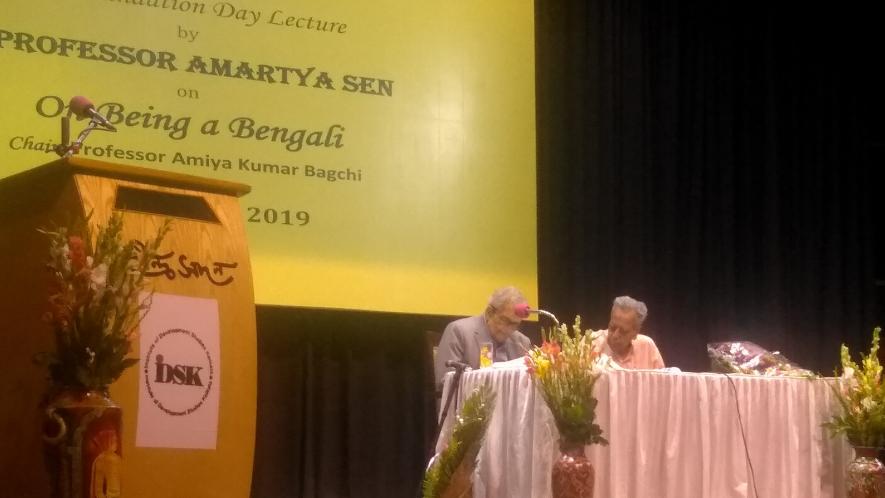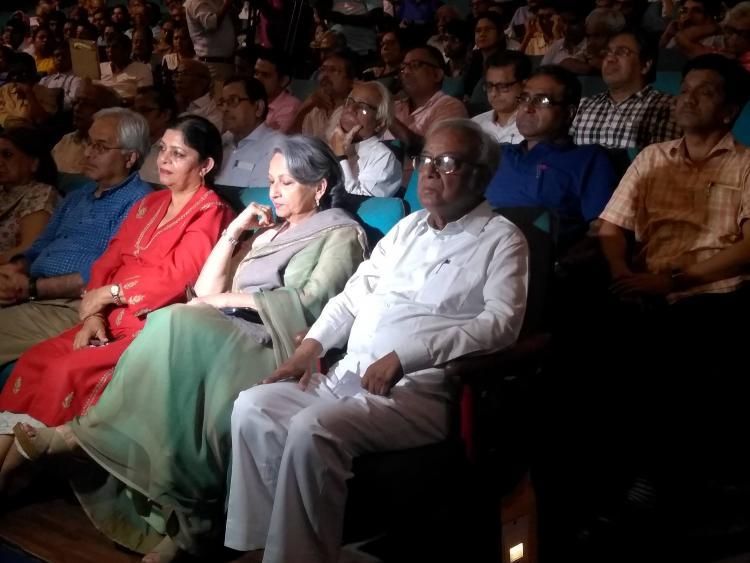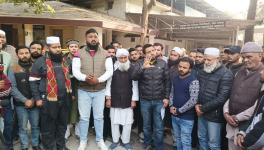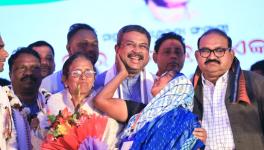Winning One Election Doesn’t Mean You Can Bulldoze All Pluralism in Society: Amartya Sen

Kolkata: Expressing concern over the current hegemonic politics of “divisiveness” in the country, Nobel Laureate Amartya Sen on Wednesday said: “Democracy is not a majoritarian exercise”, adding that “winning one election does not guarantee that you can bulldoze all the pluralism in society.”
Sen was delivering a lecture on “On Being a Bengali” to a packed auditorium at the Institute of Development Studies, Kolkata, as part of the Foundation Day programme of the research institute.

Ruing over the recent diminished influence of the Left, especially the Communist Party of India (Marxist) in West Bengal, Sen attributed it as one of the reasons for the spurt in communal polarisation in the state. He also attributed majoritarianism, as being practiced in current politics, be it in West Bengal by the Trinamool Congress and the Bharatiya Janata Party at the Centre, as the cause of the “diminished space for people and pluralistic opinion of society”.
Remarking on the weaning away of “reason” as one sign of the advent of fascist ideology, Sen implored everyone in the audience to watch a film called, Reason, by Anand Patawardhan, whom he referred to as an “able filmmaker from our Shantiniketan. He also attributed the “withering away of ‘reason’ “as the sole cause of the devastating communal riot during the 1940s in Bengal.”
The gathering was attended by the who’s who of art, science and culture, such as economists Amiyo Bagchi, Achin Chakraborty, Jean Dreze, actor Sharmila Tagore, former state finance minister Ashim Dasgupta, historian Atish Dasgupta, among others.
Sounding a subtle warning on the advent of fascism in India, the Nobel Laureate spoke of his father-in-law who he said was killed by Italian fascists. He narrated a story of “a socialist in the 1930s in Italy, who was pestered to join the fascist party of Mussolini, by the Fascist Party members. When he refused to do so, saying that his father, grandfather had all been socialists, the Fascist Party leader asked as to what he would have done had his father and grandfather been murderers. To this, the committed socialist activist replied, that in that case, he would surely join the Fascist Party.”
Sen said fascist forces take the garb of social work, like the Fascist Party in Italy did which claimed that they were fighting to eradicate malaria from Italy. Under this garb, they spread hatred in society, he added.
Tracing the route of the syncretic culture associated with Bengal, Sen said even after the Buddhist era in Bengal, there had been violence. Quoting from Sahajiya sect of Buddhism as present in the Charyapad , the oldest Bengali written literary work, and Chandimangal of Mukundadas , he explained how syncretism had always been the backbone of Bengal’s evolution. He also pointed out that Chandimangal, the famous Bengali epic, wholeheartedly welcomed the influx of Muslim populace from the West.
In lighter vein, Sen related a conversation that he heard from his maternal grandfather, Kshitimohan Sen, (a doyen of Bengali Literature and a close associate of Rabindranath Tagore), that in his village in Dhaka Bikrampur’s Sonagaon village, where he resided years ago, there was an open-hearted maulvi (Muslim cleric) who, upon seeing a prominent Hindu resident, invited him for a cup of tea. When both of them were drinking tea, a Hindu priest was passing by, who, when invited to join the duo, declined stating that he was a ‘pious Hindu priest’ (Chakraborty), and could not do so. The maulvi laughed and told him that “both are the same, as one fleeces innocent Muslim population in the name of Allah, and other does the same in the name of Bhagaban (God).”
Sen also commented on the rise of identity politics in the name of religion, which was giving rise to the “cultivation of dissonance and hatred”. He traced the roots of the present Bengali calendar as the proof of Mughal emperor Akbar’s syncretic calendar that he introduced by taking inputs from the Hindu Solar calendar and the Muslim Hijli calendar. Though Akbar’s own court members did not accept this, Akbar’s calendar was successfully introduced in his newly acquired province of Bengal.
The Nobel Laureate also pointed out that the British rulers had given rise to communal feelings out of their own interest, and in the Permanent Settlement, they gave land to Hindu landholders though during the Sultanate Period and the Nawab era, they did not try do the same for the Muslim community. He also traced that the earliest works of translating the Hindu epics, Ramayana and Mahabharata, into Bengali was commissioned by the thenMuslim rulers in Bengal, adding that the last independent Nawab of Bengal, Sirajuddaulah’s core team consisted of four Hindus and two from his own religion. “In fact, Qazi Nazrul Islam’s poems are the most popular Bengali verses after Tagore,” he said, adding that the renowned poet pioneered socialist thoughts and used to write for Langol, a mouthpiece of communists, and had also translated the biography of Karl Marx into to Bengali.
Get the latest reports & analysis with people's perspective on Protests, movements & deep analytical videos, discussions of the current affairs in your Telegram app. Subscribe to NewsClick's Telegram channel & get Real-Time updates on stories, as they get published on our website.
























